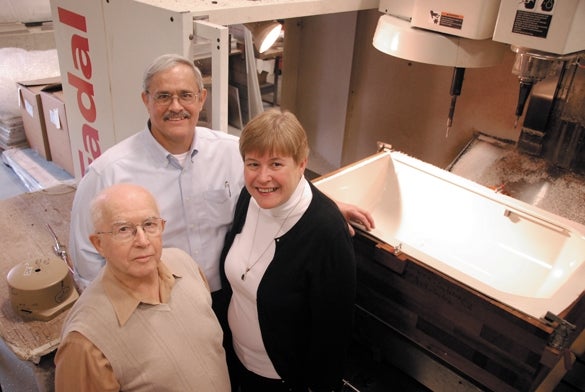Mayfield Plastics: A Pattern For Success
 PHOTO/EDD COTE
Pictured, from left to right, are: A. Gordon Cross with his son Ronald Cross and his niece Sandra Wondolowski.
PHOTO/EDD COTE
Pictured, from left to right, are: A. Gordon Cross with his son Ronald Cross and his niece Sandra Wondolowski.
Manufacturing is alive and well in Sutton, Massachusetts.
Mayfield Plastics manufactures custom-made plastic parts using a heat-driven process called thermoforming. Among its customers are medical equipment firms. Mayfield makes the sleek plastic housing for machines like CAT scanners as well as a variety of other parts.
As the medical equipment industry has grown, Mayfield has grown with it - medical firms now make up about 70 percent of Mayfield's customer base. In 2005, Mayfield outgrew its 25,000-square-foot facility in Worcester and built a space twice as big in Sutton with another 30,000 square feet available to accommodate future growth.
The firm has grown and evolved since it was established as Mayfield Plastics in 1972, but as a family firm, it goes back almost 100 years.
FOUNDER'S LEGACY
S. Ralph Cross founded the original firm in 1917 as a pattern-making business, after learning how to make complex wooden pattern forms during a five-year apprenticeship. In 1917, these wooden patterns were used in foundries to make an impression in sand, into which hot metal would be poured to make the desired part. S. Ralph Cross & Co. became the largest pattern shop in New England; during World War II, the firm had 38 pattern makers working a 10-hour shift six days a week.
In 1950, S. Ralph's son, Gordon Cross, joined the business. Gordon, now 83, is still with the firm. One of the jobs he remembers is making the patterns used to create the exhaust pipe for the U.S.S. Nautilus, the first nuclear-powered submarine.
"That was a challenge," Gordon said. "There was nothing straight! It's all curves." It seems astonishing now that a complex, curving part could be made from a wooden mold, but the pattern makers were very skilled tradesmen.
In the 1960s, Mayfield expanded its business by making molds and castings for fiberglass parts, including molds for specialty parts and prototypes for subcontractors of NASA - among them, the helmets for the Gemini program.
A MOVE INTO PLASTICS
Mold making for fiberglass led directly to mold making for thermoformed plastic parts, and then to thermoforming itself - actually creating the plastic parts. It was Gordon and his brother, Stanley R. Cross, who made the decision to go into plastics, and in 1972 they re-founded the firm as Mayfield Plastics.
In the beginning, the thermoform work was done at night, while the mold making continued to be the firm's main product. Over time, the firm transitioned from mostly mold making to mostly thermoforming. Mayfield still makes its own molds, however. Wooden molds are still used for some thermoformed plastic parts today, and Mayfield still employs four people as mold makers.
Gordon Cross's son Ronald worked for the family business from an early age, as his father had done for his father.
During high school he worked at Mayfield on nights and weekends, helping grow the new thermoforming business, and even during college - he earned a management degree from Bryant University in Rhode Island - he often came back home to work weekends.
Ron Cross joined Mayfield full-time in 1978, and is now president of the firm.
Like his father before him, Ron is leading the firm through growth and change. It was a big deal to the employees when Mayfield moved from Worcester to Sutton, but Ron knew it was necessary.
Not only did the firm need more space overall, but it had grown so large that it was in three separate buildings, an inefficient setup. Ron changed that, building the new plant in Sutton that allows the entire manufacturing operation to be on one floor and provides room for future growth.
That investment required that the firm ramp up sales, and Ron has successfully led that growth.
The changing nature of the business has also required that the company adapt. Yet the more things change, the more they stay the same.
"One of our strong points is the overall philosophy that the family has," Ron said. "The Yankee mentality. We're as honest as the day is long, and if we say we're going to do it, we do it. My grandfather always used to say, ‘We do business on a handshake,' and that's still our philosophy today."








0 Comments